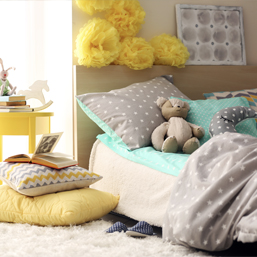
Dirty socks are mixed in with a pile of building blocks. Shoes, barrettes, and random beads litter one corner of the room. Open books cover the bed, spines facing up, to hold the page in the absence of bookmarks. The dress-up basket lies upside down atop a sea of tulle, spandex, and polyester.
My preschooler’s room drives me crazy. My husband thinks I should let it go. (Note: He places no value on organization and possesses an uncanny ability to locate any random piece of paper among the stacks littering his office.)
I try to let it go, and I'll be chill for a while, but eventually, I run out of patience; usually when I can't find a path to her bed, or when there’s nowhere to put a basket of clean laundry. At that point, I go into "mean-mom" mode. I yell, then I feel guilty, then I apologize to my daughter for overreacting, and I resolve to chill out. Inevitably, the cycle starts again.
Is the key to breaking this cycle finding a way to keep my daughter’s room clean, or finding a way to stop caring?
Like most aspects of parenting, there is no one right answer to this question. According to Jill Ceder, psychotherapist and parent coach, the research is inconclusive. “Some research shows that chaos negatively affects us while other research shows messiness encourages creativity.”
We do know that people are either born with the “clean gene” or not. If tidiness isn’t in your kid’s genes, Jill reminds parents that our role is to coach our kids, not to control them, which means avoiding nagging and yelling. She advises parents to drop the power struggle entirely if it’s becoming a major issue. “If you can, muster up the strength to close the door and forget what is behind it. Realize that there is a difference between old smelly wet towels shoved in a corner and a pile of school papers on a desk.”
On the other hand, Kate Paisley Kennedy, an executive function and organization coach and Lead Gifted Education Specialist at Chapel Hill Carrboro City School District, says it’s crucial that kids keep their rooms clean. “It teaches the skill of breaking a job into small chunks without the risk of failure, which is often attached to school work.”
So how can you get kids invested in cleaning their rooms?
Have a place for things. It’s easier to tidy when there is a place for everything. You don’t have to spend a lot of money on a complicated system. Boxes and baskets you already have will do the job. A shoebox can store blocks, or a laundry basket can house stuffed animals.
Minimize stuff. Fewer things means less work, less overwhelm, and less chance of tripping. I do stealth purges, leaving my kids’ toys in a holding area before donating them, in case they ask for the missing toys before I get to Goodwill. However, my kids (ages three and five) are often willing to collect toys for needy kids when asked.
Break it down. The idea of cleaning a messy room is overwhelming (even for adults), until you break it down into smaller pieces. Child therapist Maria Arias recommends letting kids choose a task. My daughter usually throws a fit when it’s time to clean her room, but if I ask, “Do you want to start with books or clothes?” she’ll pick one and get started. Often, children respond better to a task list, than to verbal instructions. You can write a to-do list with your child, or use a picture schedule for younger kids who can’t read yet. Kate recommends breaking a project like room cleaning into time-based chunks, to avoid overwhelm. For example, you can set a timer for five minutes, and take a break at that point.
Some parents report a total absence of power struggles or negotiations in order to get their kids to clean their rooms. With kids ranging from three to 12 years old, these parents had one thing in common: They’d established a solid clean-up routine when their kids were very young.
Jill recommends not only expecting kids to do chores when they’re young, but also building clean-up into their schedule. For example, the routine could be to clean your bedroom every Saturday morning before you’re allowed to do something fun, every night before dinner, or before starting a new activity. What matters is that the routine is consistent and that kids know the consequence for not participating (ie: you don’t get to go to gymnastics or have screen time if it’s not done).
Maria emphasizes the importance of clearly communicating your expectations and why they matter. To do this, she recommends:
Parents reported the following strategies to infuse fun into the process. (Many of the “fun parents” admitted to threatening to chuck all the toys from time to time.)
According to Kate, “a positive reward works eight times faster than a negative consequence.” The reward can be as simple as stickers or verbal praise. Jill agrees that it’s important to praise effort. She encourages parents to take note whenever their kids take responsibility for their messes, “and use this as a time to connect, engage, show appreciation and encouragement.”
That said, many parents report success using candy, toys, and screen time as a reward. One dad reported his son, age five, kept his room clean for 14 days straight, motivated by the promise of a new toy.
Pam is an award-winning freelance writer, intuitive eating coach, and host of the Real Fit podcast. Get her free guide to improving your body image at pam-moore.com.
See our related articles:
Calgary’s Child Magazine © 2024 Calgary’s Child